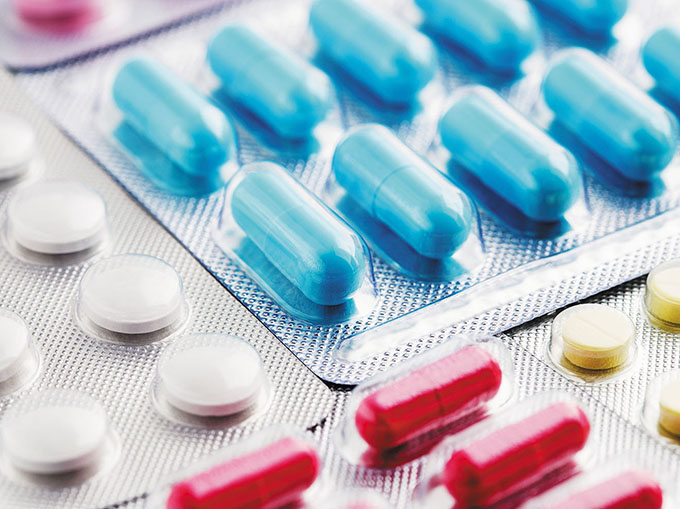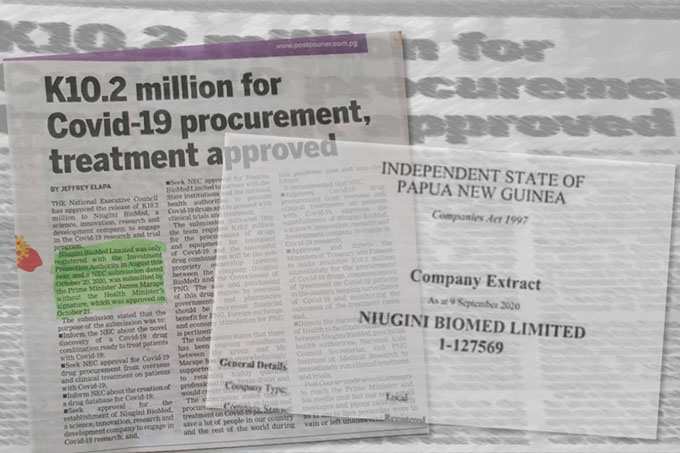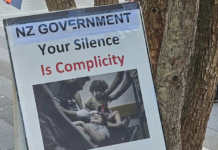
COMMENTARY: By My Land, My Country
The Post-Courier newspaper says a company, Niugini BioMed Ltd, set up just a month ago, will be be commissioned to create a new “miracle drug” that will save people in Papua New Guinea and around the world from coronavirus.
The newspaper said several ministers were not happy with the K10.2 million (US2.8 million) grant because they did not believe proper processes were followed, reports RNZ News.
But Prime Minister James Marape said the report was based on leaked national executive committee (NEC) documents and was a deliberate attempt to discredit his government.
He said the government had yet to make a decision on the grant.
Two commentaries about the controversy have been published this weekend on journalist Scott Waide’s independent blog My Land, My Country.
- READ MORE: ‘Million kina covid cure’ – K10 million awarded to company started just one month ago
- PNG leader says covid-19 esearch grant not yet decided
View 1: Explaining the process of drug development
By Barbara Angoro, a PNG doctoral student in Auckland
Reading the news on covid-19 drug production in Papua New Guinea has prompted me to do my take on it. Those who are familiar with drug research and development will agree with that screening for possible drug leads is just the start to call it a drug, there has to be research done and data available on the pharmacokinetic and pharmacodynamic profile of the drug.
Drug screening is the most basic step
Based on what I read in the Post-Courier, I get the impression that the academics have done simulations using existing drug molecules that are likely to have some drug activity against covid-19.
In a drug development timeline, this is the most basic step – you screen a whole heap of possible molecules and come up with a few potential candidates. After this step, the real drug development research happens in the lab:
Is it safe? What’s the mechanism of its actions? How is it absorbed, broken down, distributed in the body, excreted ? What is the best dosage to give? What are the side effects?
How does it work in different groups of people? If there are existing treatment, does this one do better? How do you dispense this drug – through the mouth, injection etc?
Drug development is a lengthy process
After these parameters are determined, it leads to next stages that involve clinical research and finally a review done by regulatory authorities to get approval to be used as a “drug”.
These steps can take up to 10 years, and one must have an equipped and accredited laboratory in order for the developed drug to be recognised. Because of the pandemic situation, teams around the world are fast tracking processes to find a possible vaccine for covid-19.
Covid-19, being a virus, makes it hard to find a drug cure – it is always several steps ahead, mutating and changing.
Not only that, but unlike bacteria which have their own machinery to survive, viruses tend to use the host machinery (body) to replicate.
Scientists around the world stick to vaccine development
Development of a drug that will target only the virus without causing toxicity to the human host has proved difficult. Hence, many scientists worldwide are sticking to vaccine and not drug development.
While I believe in PNG taking lead in drug research and development, I strongly feel that taking an approach that involves building the necessary infrastructure first, getting accreditation and looking at developing drugs that will target common illnesses seen in our country would be the way to go.
A well thought out plan with solid financial backing would do – not a novelty concept for covid-19 which quite frankly, based on past virus outbreaks, could quickly resolve just like it appeared, making this endeavor come to nothing.
This is my personal view as a PNG citizen (with a pharmaceutical science and pharmacology background) and does not represent that of any organisation that I am associated with.
View 2: Other priorities outweigh giving K10 million to a start-up
By Deborah Ruth Telek

We cannot even get National Agriculture and Quarantine Inspection Authority (NAQIA) accredited laboratories up and running around Papua New Guinea for various lab testing our requirements.
These labs are used for testing water supply samples and processed food samples for public safety. But we want to leap frog over all the other things this country needs and do drug research.
Wow!
The National Institute of Standards and Industrial Technology (NISIT) is failing and cannot handle the local calibration of weights, thermometers and other standard measurement equipment so it needs to be outsourced or referred to the private sector.
It seems we have forgotten about the necessity of this associated enabling environment and are considering paying a start up entity for drug research.
Shocking!
Let’s say goodbye to our tax money! I mean, the government has just restructured an existing loan with the Bank of the South Pacific (BSP) and given us some breathing space so that K10.2 million is possibly just loose change that fell out of the Prfime Minister’s pocket while he was listening to their spiel.
I wonder if the EMTV news item, about Niugini Biomed justifying themselves, is reminiscent of how they presented to Prime Minister Marape?
Imagine if they were rambling like that in front of the PM too? Would he still buy it, hook line and sinker, with that poor presentation?
Right thinking Papua New Guineans would say NO to the Biomed proposal in its current form and at this time.
We have other pressing priorities!
Articles from Papua New Guinea journalist Scott Waide’s blog My Land, My Country are republished by the Pacific Media Centre with permission.







































